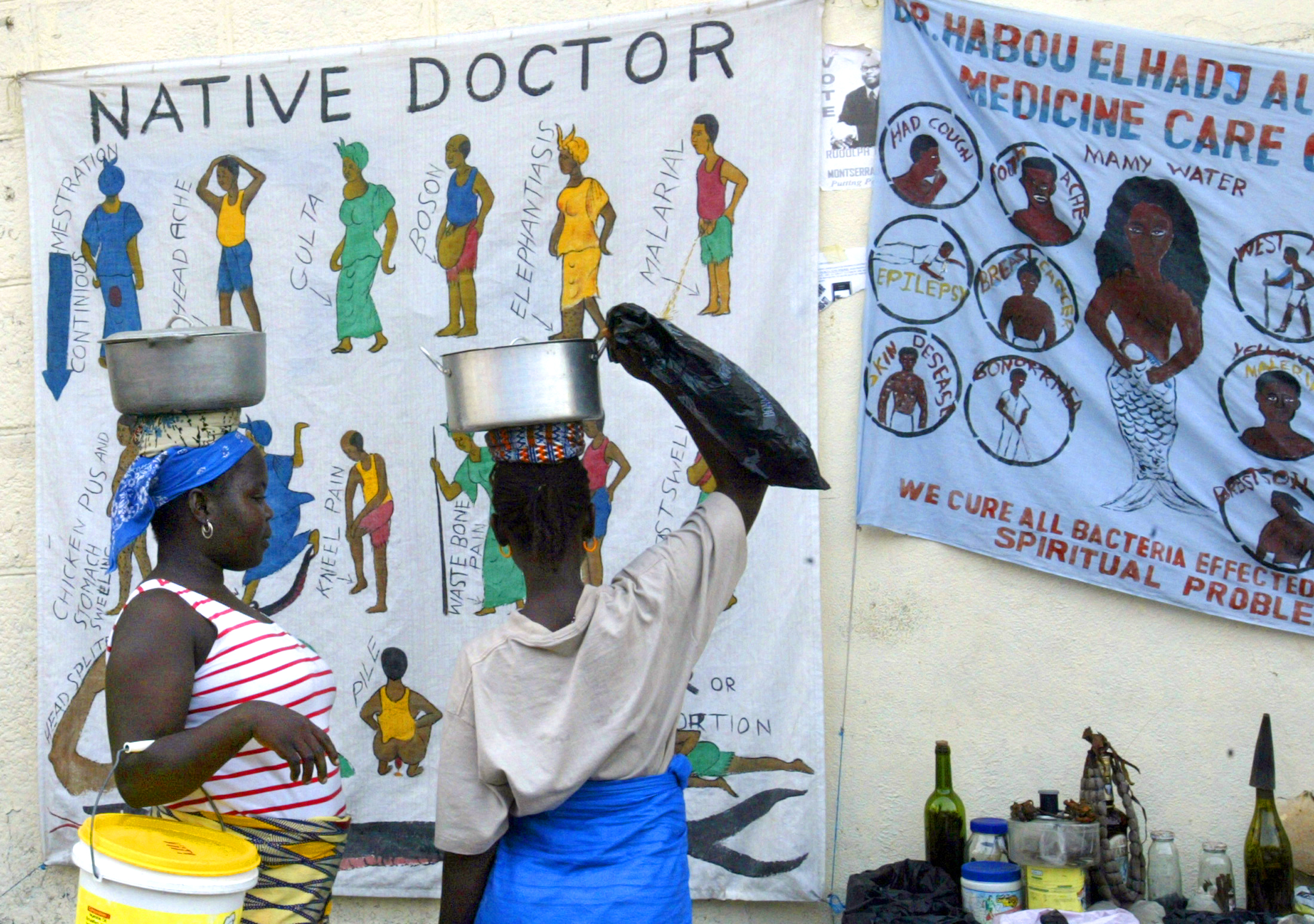The moral mathematics of second-string medicine in West Africa
Welcome to Liberia

A free daily email with the biggest news stories of the day – and the best features from TheWeek.com
You are now subscribed
Your newsletter sign-up was successful
The head of a three year old is surprisingly heavy. I position Kuna's limp neck over my lap and cradle her blue-black face in my gloved hands. Moving the harsh circle of the operating microscope's light over her unblinking eyes, I focus on the white pupils filling my view. Kuna is blind from cataracts.
"I would like to operate this patient, Dr. Rose. I can give her sight."
"How would you operate on the eyes of this patient, Robert?"
The Week
Escape your echo chamber. Get the facts behind the news, plus analysis from multiple perspectives.

Sign up for The Week's Free Newsletters
From our morning news briefing to a weekly Good News Newsletter, get the best of The Week delivered directly to your inbox.
From our morning news briefing to a weekly Good News Newsletter, get the best of The Week delivered directly to your inbox.
"I can make her see. Why I should not do that?"
"What is your plan, Robert? She is only three years old. She is malnourished and in poor health. She could die from complications of sedation. You must operate only as a last resort."
"But I will do a good job."
"She may be blind forever if the surgery does not go well, or be in chronic pain. Bleeding, infection…"
A free daily email with the biggest news stories of the day – and the best features from TheWeek.com
Robert chuckles. "Oh, Dr. Rose, I don't think much about that. I can do it. Teach me how she can be fixed most well."
I work against the clock to operate on both of Kuna's eyes before she wakes. Ketamine, a tranquilizer commonly used for animals, is notorious for causing muscle spasms and nightmares, but it's all we have. Robert is a non-physician eye surgeon in Liberia, West Africa, and in the absence of better-educated surgeons, he's nearly all they have, too. I've volunteered to teach him how to improve his skills — despite deep reservations about both the ethics and the efficacy of doing so.
Here in Liberia, healthcare is essentially nonexistent, transportation poor, electricity intermittent, and clean water rare.
My nose and eyes sting from the disinfectant that permeates the stifling room. Tiny spiders crawl on the walls where strips of surgical tape hang in preparation for Kuna's postoperative dressing. Rain pounds down on the corrugated roof and rivulets of sweat slowly worm their way down my back. I feel the heat radiating from Robert's eager face as he leans over my shoulder to watch every detail. The patient on the adjacent table is so close he could touch us.
At Kuna's feet sits a nurse who administers sedation by way of an intravenous in her foot. Supplemental oxygen, basic monitoring, and emergency supplies are not available should she stop breathing or need heavier sedation. I feel like a time traveler, transporting medical expertise to a previous century.
A faint grittiness at my fingertips confirms the intended depth of my initial incision. I think of Kuna's mother, who had placed Kuna into my arms saying, simply, "Now." We stared at each other for a moment that felt timeless; white to black and black to white, parent-to-parent, but across a universe. "Now. You fix my girl." Robert inhales as I enter her eye.
Nearly forty million of the people alive today are blind, and almost six times that many are severely visually impaired. The vast majority of blindness occurs in the developing world, due largely to cataract, the clouding of the lens within the eye. Home in Connecticut, I can cure cataract blindness with a painless operation that takes mere minutes to perform.
But here in Liberia, healthcare is essentially nonexistent, transportation poor, electricity intermittent, and clean water rare. When you're blind, the statistics are grim: 80 percent of blind infants die by the age of two. If you're older, the folk expression sums it up: "A blind man is a mouth with no hands." Society cannot support those who cannot support themselves.
Who can serve those in need? There is a chronic shortage of medical practitioners throughout the developing world. Funds are lacking, and the process of training physicians is lengthy and expensive. Educational facilities are meager, expertise rare. Young doctors from the developing world lucky enough to train abroad rarely return home to work, and those who do almost never serve in the rural, impoverished regions where they are needed most. Patients are sicker, the work is harder, resources are slimmer, remuneration is lower, and burnout is endemic.
To help fill the desperate shortage of doctors throughout the developing world, trainees such as Robert have begun to receive enough rudimentary medical training to practice general medicine, general surgery, obstetrics, orthopedics, and anesthesia. This is a subject rarely discussed outside of public health circles, for it hides an uncomfortable truth: Complication rates deemed unacceptable in the industrialized world are tolerated when there are no other solutions at hand. Most physicians who are sophisticated about global medicine have come to condone the practice, although the vast majority of Western doctors still find the idea anathema.
Should non-surgeons perform eye operations, as well? Among the surgical subspecialties, the precision and manual dexterity required to perform ophthalmic procedures is unparalleled. For that reason, the concept of delegating eye surgery to non-physicians remains especially unacceptable to most doctors, despite a 1999 World Health Organization initiative to eliminate avoidable blindness by the year 2020 — in part by training non-physicians to perform cataract surgery. I am torn on the issue: The status quo is obviously intolerable, but I am not convinced that non-surgeons can function in place of doctors. Robert finished his training a year ago, and it is to measure his capabilities that I sit here with a child's future in my hands.
I state the obvious through clenched teeth: 'We… need… more… sedation.'
The next several minutes go well. I show Robert several techniques for the removal of pediatric cataracts. Working within the transparent fluid of her eye's front-most chamber, I tear a perfect circle in the outermost membrane of her lens and gently suck out its cloudy contents with a modified syringe. Then I polish the one-cell-thick membrane that will support the artificial lens to be implanted. This is folded, taco-style, in preparation for insertion. The heavy wooden table upon which Kuna lies is poorly designed for microsurgery. My legs awkwardly straddle the wide corners as I attempt to manipulate one foot pedal for focus, and the other for magnification. My neck aches. I concentrate on positioning the lens implant as it begins to unfold, shimmering with reflected light within her eye.
Suddenly Kuna jerks her head, violently. "Oh no!" Robert shrieks — far too loudly. Operating room protocol strictly prohibits such exclamations, even if they perfectly express everyone's reaction, and especially when the patient is rousable. Outbreaks such as Robert's shred the illusion of control required when performing surgery. Kuna is regaining consciousness while instruments are engaged within her eye, and this is a particularly bad moment for this to be happening. Delicate tissue can easily rip, causing complications I don't have the equipment to manage. The pupil is distorted into a vertical slit, like a cat's eye. I can neither reverse nor avoid this crucial stage of the operation.
Soothing Kuna with my voice, I attempt to brace her flailing head with my wrists while stabilizing the instruments that hold the twisted implant. I lift my gaze from the microscope for a fleeting glance at my co-workers. Robert is sitting this one out so he can concentrate on observing. The scrub nurse sorts instruments with a detached air, while the nurse anesthetist stares distractedly at the floor. What kind of teamwork is this? I think. I state the obvious through clenched teeth: "We… need… more… sedation."
I lull Kuna back to sleep despite the blinding light in her face, which is covered with a drape. Braced for her next lurch while willing my muscles to relax, I delicately dial the glistening lens into its intended resting place. I aspirate the surgical gel from inside the eye, tear a circular opening in the center of the remaining membrane that holds the implant, and confirm that the pressure is neither too low nor high. I am close to finishing the first eye and am just beginning to close the incision when — bang, an earsplitting boom. My view darkens to nearly black as the operating microscope cuts out. The pit of my stomach registers a free fall. Holding suture material a fraction of a hair's thickness, my eyes are glued to the barely distinguishable image that lingers in the eyepieces. "I am so sorry, Doctor Rose," Robert says. "The generator, it has broken."
Rendered without useful sight myself, I cradle Kuna's lolling head and coax the curved needle through its arc, guided purely by the instinct of long experience. Except for my fingertips and the slowly expanding bands of sweat that soak my cap and mask, I am entirely immobile, remotely conscious that furious activity surrounds me. This is a silent inner space, devoid of thought, accompanied only by Robert's breath in my ear.
Kuna's head finally relaxes, and as I close her incisions, returning the pupil to round and cleaning away the blood, the natural beauty of her eyes is restored from the violation of surgery. Trimming and burying the suture knots, I realize that at some point, without my notice, Robert has illuminated the surgical field with a hand-held flashlight. It is deeply gratifying to feel I'm not alone.
READ THE REST OF THIS STORY AT THE BIG ROUNDTABLE.
This story originally appeared at The Big Roundtable. Writers at The Big Roundtable depend on your generosity. All donations, minus a 10 percent commission to The Big Roundtable and PayPal's nominal fee, go to the author. Please donate.
-
 Democrats seek calm and counterprogramming ahead of SOTU
Democrats seek calm and counterprogramming ahead of SOTUIN THE SPOTLIGHT How does the party out of power plan to mark the president’s first State of the Union speech of his second term? It’s still figuring that out.
-
 Climate change is creating more dangerous avalanches
Climate change is creating more dangerous avalanchesThe Explainer Several major ones have recently occurred
-
 What’s TrumpRx and who is it for?
What’s TrumpRx and who is it for?The Explainer The new drug-pricing site is designed to help uninsured Americans